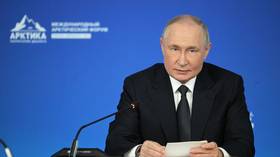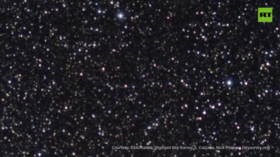Sanctions against Russia ‘unavoidable’ if OPCW confirms activist Navalny was poisoned with ‘Novichok’ – German Foreign Minister
The EU is poised to slap Moscow with new sanctions if the Organization for the Prohibition of Chemical Weapons (OPCW) confirms Russian opposition figure Alexey Navalny was poisoned with a ‘Novichok'-class nerve agent.
That's according to German Foreign Minister, Heiko Maas. “I am convinced that sanctions will be unavoidable in that case” he told Germany's t-online news portal, on Saturday, speaking about what the European Union would do should the OPCW confirm conclusions reportedly made earlier by a German military laboratory and facilities in France and Sweden.
Also on rt.com US senators suggest going after Putin’s 'personal money' in response to alleged poisoning of opposition figure NavalnyThey claimed that Navalny was poisoned by a substance from the ‘Novichok’ group – a cluster of deadly military-grade nerve agents. Berlin and its Western allies almost immediately blamed the incident on Moscow. Russia repeatedly denied the accusations while saying it was far from being the only nation that has access to the toxic formula.
Moscow also said requested data on Navalny’s case from Berlin while insisting it was ready to cooperate with the German authorities on the probe into the incident. However, Germany has so far failed to provide any data to Russia, according to Russian officials.
Instead, Berlin expects the EU to give a “clear answer” to Moscow over its alleged transgressions, even though no conclusive evidence suggesting the Russian authorities have anything to do with Navalny’s alleged poisoning have been presented so far. Still, Maas believes that “such a grave violation of the International Chemical Weapons Convention” simply “cannot go unanswered.”
However, Germany appears to be reluctant to sacrifice Nord Stream 2 – a major gas pipeline project that would link Russia and Germany – in the new sanctions campaign against Moscow. Earlier, Maas himself said he isn’t ruling out that the project could be affected.
Also on rt.com ‘Anti-Russian hysteria’: Moscow hits back after EU Parliament calls for sanctions over alleged poisoning of activist Navalny“One has to consider carefully the conclusions that are to be drawn from Navalny’s case. More than 100 European companies are involved in the pipeline construction, half of them from Germany. Many European workers would suffer if the construction is to be frozen,” he told t-online on Saturday.
The OPCW’s involvement in this case has sparked concerns in Moscow, which argued the organization has already been used in geopolitical games before.
The chemical watchdog’s authority has indeed been tarnished by a series of whistleblower revelations claiming that reports on alleged chemical attacks in Syria were deliberately altered to pin the blame for them on Damascus – in line with the position taken by the US and its allies in London and Paris long before any investigation of the incident took place. Back then, the three countries immediately launched joint airstrikes against the Syrian Army facilities after the supposed chemical attack in Douma in 2018.
OPCW president Fernando Arias already rushed last week to declare Navalny’s alleged poisoning an instance of chemical weapons use and a “violation of international law.” The Russian mission to the organization, meanwhile, questioned the very fact that any data on the opposition figure’s case was sent by Berlin to the OPCW at all.
Also on rt.com Russia calls upon OPCW to release data on Navalny ‘poisoning’ to all member states; says Germany failing to provide answersNavalny's life was initially saved by doctors in the Russian Siberian city of Omsk before he was flown to Germany. The Russian medics who treated him maintained they found no traces of any particular poison in his analysis samples. The scientists who developed the Novichok toxin also questioned Germany’s claims about his poisoning, arguing that the symptoms he displayed did not match exposure to the substance.
Think your friends would be interested? Share this story!














